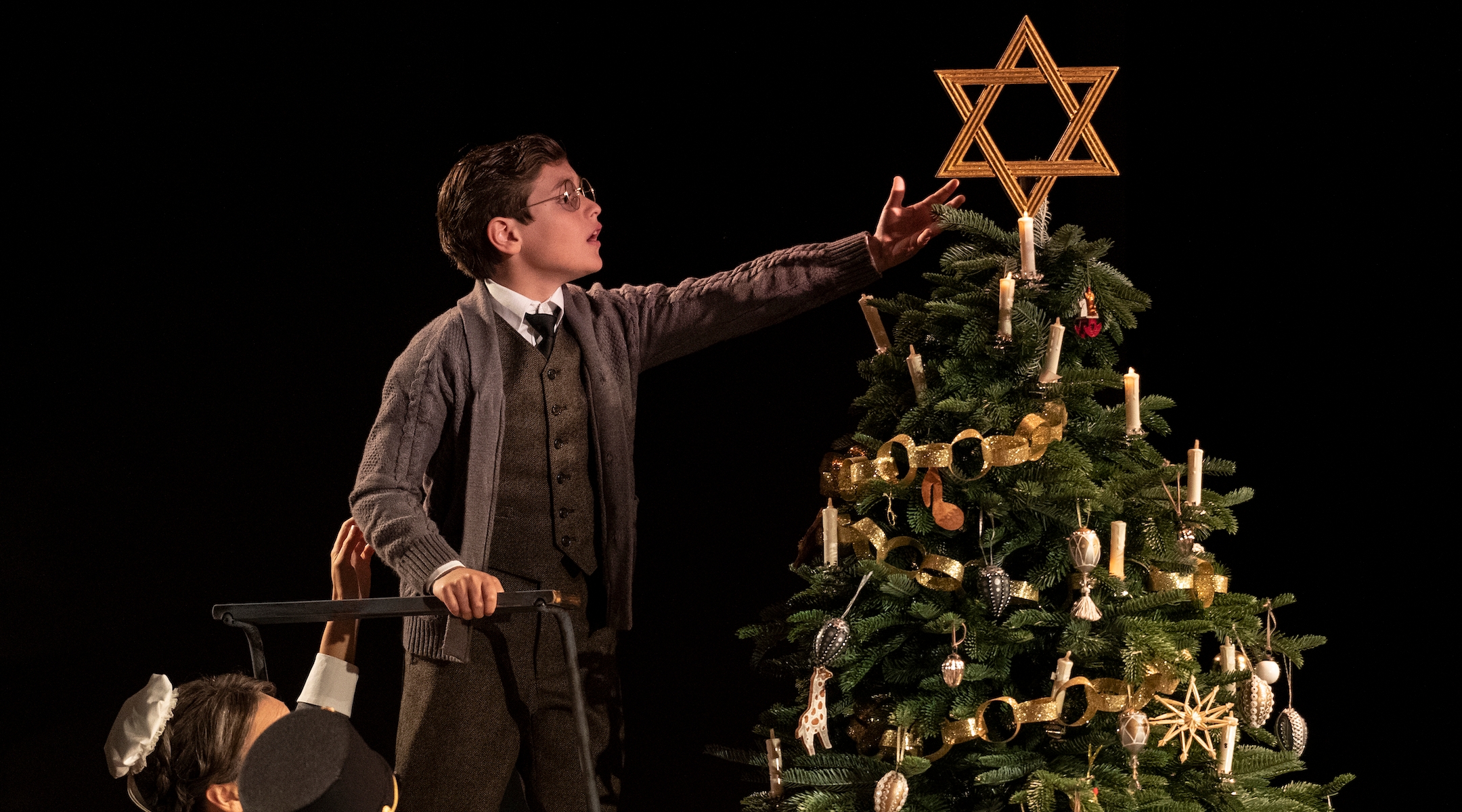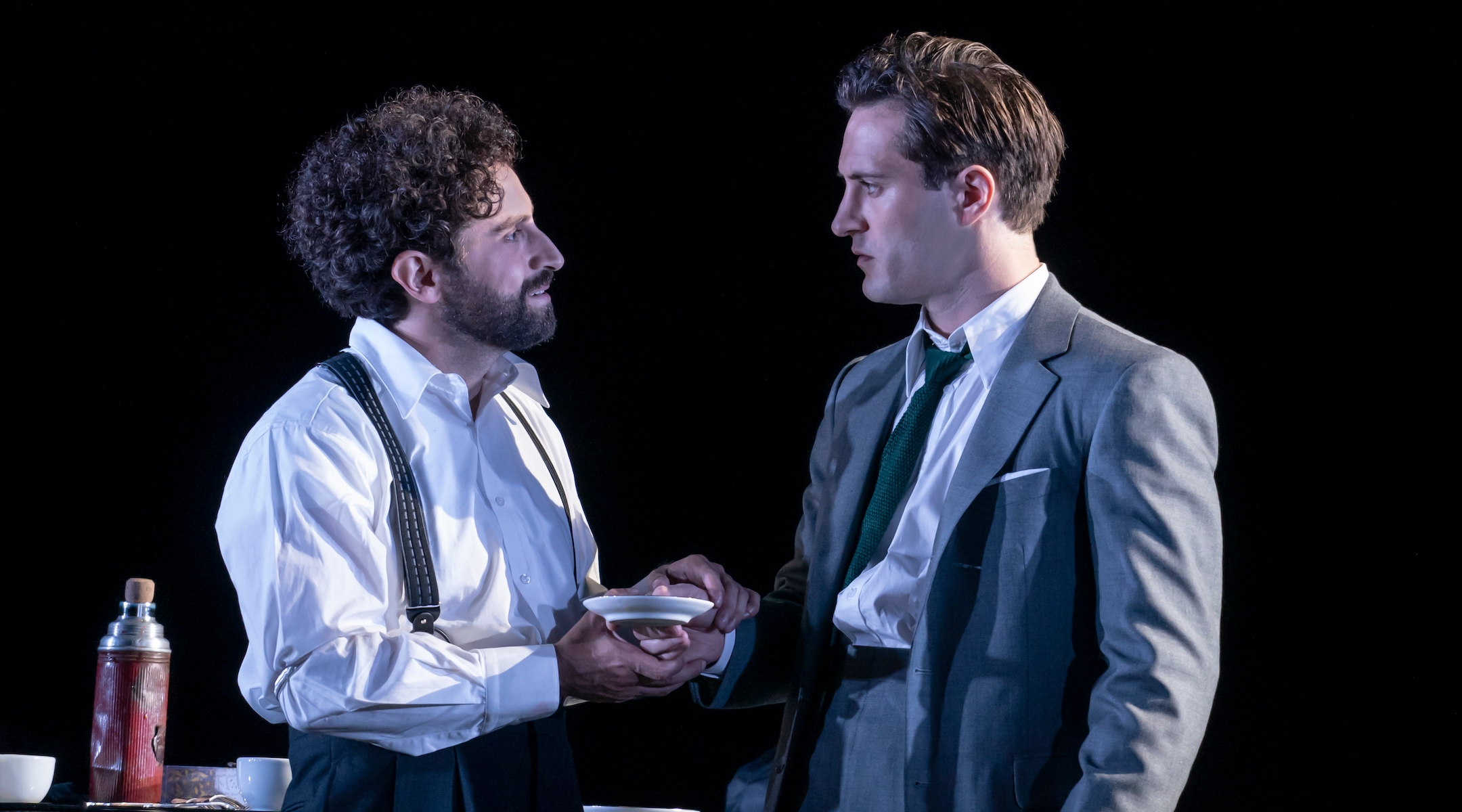(JTA) — Speaking on the phone from an empty balcony in the Longacre Theater in New York, several hours before a preview performance of his latest play, Tom Stoppard said the show is “one that people like to talk to me about.”
“Leopoldstadt,” which officially hits Broadway on Sunday after an award-winning London debut in 2019, follows multiple generations of a Jewish family in Vienna from the turn of the 20th century through World War II and formation of the state of Israel. Audience members in the preview period have often lingered in the theater after the shows, and Stoppard — one of the world’s most respected playwrights of the past half century — said “it’s just amazing” how many of them see parts of their family history in the show.
So, perhaps unsurprisingly, he asked on the phone: “What about your family?”
The answers he received: this reporter’s family members are inexact about their history, since no one has ever done a DNA test or compiled comprehensive family tree; there are rumors of rabbis from Poland and ancestors from Iraq; there is an uncle whose German-Jewish family displayed Christmas trees in their New York City apartment for decades; and there are various relatives around the globe who know little to nothing about each other’s existence.
Those answers touch on the array of themes that are introduced in the first minutes of “Leopoldstadt,” which is also the name of Vienna’s storied Jewish quarter and where the play is set. The play is on its surface about several broad developments — the horrors of antisemitism and the Holocaust, the relationship between socialism and “National Socialism,” the debate over Israel’s formation. But at its core is a reckoning with the complexity of 20th-century Jewish family histories: how persecution led many to crave assimilation, and hardened others to defend their heritage; how pogroms and wars split up family trees and scattered them across Europe, and beyond; how trauma affected their descendants’ memories of family and of the moments that pulled them apart.
These are the heady questions that Stoppard, now 85, has been thinking about for the past couple of decades, as he leaned into learning about the Jewish heritage that his family mostly suppressed for the first half of his life.
“I was writing lines which have been at the back of my head for a long time now,” he said.
Stoppard — whose body of work includes “Rosencrantz and Guildenstern Are Dead,” “Travesties” and the screenplays “Empire in the Sun” and “Shakespeare in Love” — was born in Czechoslovakia in 1937 to two Jewish parents. When the Nazis invaded in 1939, his family fled to Singapore, where the shoe company his father worked for had a factory. But Japan would occupy Singapore, so Stoppard, his brother and mother left for India; his father, who tried to leave later, died on a ship bombed by the Japanese.
In India, his mother married a British soldier named Kenneth Stoppard, and Tomas Straussler became Tom Stoppard. After Tom attended a Christian boarding school in Darjeeling for a few years, the Stoppards moved to England, where he developed a deep English sensibility and love for all things English, from the monarchy to the country’s famously dry and absurd sense of humor. The Strausslers’ Jewishness, like the name, became a thing of the past, as encouraged by a hardheaded stepfather and a mother looking to let go of her traumas.
“I came on well as an honorary Englishman. Ken taught me to fish, to love the countryside, to speak properly, to respect the monarchy,” Stoppard wrote in a 1999 article in Talk Magazine titled “On Turning Out to Be Jewish.” “I was still Tommy Straussler, but English was my only language when Ken gave me his name three weeks later.”
It wasn’t until the 1990s — several decades into a career that had already yielded three Tony awards for best play — that Stoppard first confronted his Jewishness in a significant way. The granddaughter of his mother’s sister contacted him in 1993, and they met in London, where she sketched out the Straussler family tree on paper for him.
“I know we were Jewish,” he said, but asked, “How Jewish were we?”
“You were completely Jewish,” his relative Sarka Gauglitz said.

The play explores how Jews assimilated into Austrian culture. (Joan Marcus)
Stoppard’s ignorance set off an intense guilt. The following year, he visited a synagogue in Prague where some of his relatives’ names are inscribed on the walls, memorializing the fact that they were some of the thousands of Czech Jews killed in concentration camps. His mother died in 1996, further pushing him to research the history she had kept from him.
Stoppard’s subsequent works, as a common narrative goes, gradually became more emotional and romantic, in contrast with his earlier plays more known for their absurdity, humor, philosophy, history, social commentary and other intellectual topics. He has said he now appreciates writing with “a love story in it.”
But his guilt would not bubble over onto the page (Stoppard still does not own a computer and has an assistant type up his handwritten work) until several years later. There are moments and characters in “Leopoldstadt” inspired by his family’s story, he explained, but it is not a directly autobiographical play. The setting of Vienna, for instance, reflects his decades-long obsession with that city’s history and its rich cultural milieu; the play makes frequent mention of Vienna’s famously influential and prosperous Jewish class, of which several of the story’s family members are a part. The trajectory of Sigmund Freud, maybe the most famous Viennese Jew of the time, is also followed closely, as the characters look to him for inspiration on whether to stay or leave as the Third Reich begins its rise.
There is at least one character who is based directly on a real person, though: Leo, a young, urbane writer, is meant to be a stand-in for Stoppard himself and appears at the end in a scene that is clearly inspired by the playwright’s first encounter with his Jewish family tree in 1993.
As the play begins in 1899, the characters quarrel about the state of Jews and antisemitism in Austria, the merits of assimilation and the burgeoning Zionism movement. Some of them, including Herman — a wealthy textile businessman and the closest the play has to a protagonist, played by “Numb3rs” star David Krumholtz — are married to non-Jews, a fact that adds texture to the debates. In the first scene, the assembled family gathers at a dinner with a Christmas tree, to which they affix a large Star of David ornament.
Later, the play yields a hilarious scene involving a bris, a significant achievement given the fact that Stoppard had no idea what the circumcision ritual or any other religious Jewish custom involved as he started his research. He ended up asking some friends, including the Jewish essayist Fran Lebowitz, for help with details along the way.
“He’s a genius — he can read the research and reimagine it in dramatic form,” the play’s director Patrick Marber, a respected playwright in his own right who is also Jewish, told the Jewish Telegraphic Agency. “But he hasn’t lived it.”
The writing of “Leopoldstadt,” for Stoppard, who had previously written some three dozen plays, felt different.
“The great thing about theater is that you don’t have to include that much,” Stoppard said, downplaying the extensive research he does before each work. “To a large extent, the play has to trade on the knowledge that the audience brings to the theater.
“But I found myself treading quite delicately” [with “Leopoldstadt”], he said, adding that he felt a deep responsibility to dig deeply into the issues raised.
The play’s family ends up extremely fractured, and most die in Nazi camps. A heartrending twist at the end gets at the extreme ways some Jews went to save members of their families.
Stoppard said he nearly named the play “The Family Album,” a fact that is poignant when considered in the context of a scene from the play’s beginning involving a photo album. It becomes more relevant as the story unravels and the family’s branches are scattered about, and murdered.
“I’ve been writing in names that are missing, the ones I know, which is by no means all of them,” the family’s matriarch says in the opening act as she holds a photo album. “That’s what happens, you see. First, there’s no need to write who they are, because everyone knows that’s great-aunt Sophia or cousin Rudi, and then only some of us know, and already we’re asking, ‘Who’s that with Gertrude?’ and ‘I don’t remember this man with the little dog,’ and you don’t realize how fast they’re disappearing from being remembered.”
For the fans Stoppard has talked to, “It’s as though they’ve never seen the subject dealt with before like this” on stage, he said, arguing that the most poignant and prominent Holocaust-themed works have often been reserved for Hollywood.

Brandon Uranowitz, left, as Nathan, and Arty Froushan as Leo. The latter character is a stand-in for Stoppard. (Joan Marcus)
Marber — who is best known for writing “Closer,” the play that inspired a film of the same name starring Natalie Portman and Jude Law — grew up going to synagogue in London and has proudly declared himself over the years to be a “Jew first, Englishman second.” But even he has been deeply moved by the experience of working on “Leopoldstadt” (he directed the British version as well). He now regularly wears a Jewish star necklace, for example, which his non-Jewish wife gave him during New York rehearsals.
Krumholtz, who descends from Hungarian and Polish Jews, has become more in touch with his Jewish identity throughout the process, too, Marber added.
“This is the first time I’ve understood the feeling of Jews feeling the ground shifting beneath their feet, and not being able to believe it would get that bad,” Marber said.
As he prepared to leave the balcony (“I have to see who else needs me”), Stoppard admitted, maybe not purposefully, that he is still learning about the ripple effects of Jewish history. For instance, he said “it’s incredible” how many family New York City families he has learned about from fans that have legacies that aren’t “so different from the family in the play.”
There’s another dynamic that has surprised him, too, related to all of the buzz the play has generated.
“I thought that the subject of the Jews through the war had been done and done,” he said. “But actually, not really!”
—
The post In ‘Leopoldstadt,’ Tom Stoppard tackles the Holocaust, intermarriage, Zionism — and his own Jewishness, for the first time appeared first on Jewish Telegraphic Agency.















